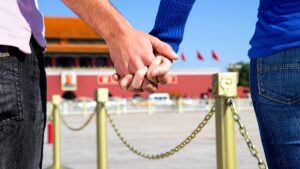Get your hawks out lads – it’s time to go Chinese house hunting again

Via Getty
It looks like China’s stupified property market may’ve finally been startled awake after almost two years of falling values, with new data showing Chinese households enjoyed a warm welcome at local lenders over the first quarter, successfully borrowing more money to buy homes.
According to a top People’s Bank of China official this week, the country’s falling mortgage rates and the bouyant response from borrowers in Q1 is a positive signal in an otherwise Bermuda triangle of silence from the country’s hollowed out real estate market.
China’s housing sector expanded for the first time in seven quarters, according to China’s National Bureau of Statistics.
Data from the NBS by industry shows real estate rising 1.3% on the year for the January-March period. That’s mega, as I often say. Especially since it comes off 6 straight falling quarters.
After restricting debt-laden developers’ access to new cashola, local provincial and the national governments have turned on a few taps to splash, if not submerge the housing market in some liquid.
There’s been some outside the box thinking too, which we’ll get to.
But for now, sales of newly built homes increased on a measurement of floor space and that my friends is a corner turned.
Like fresh coke
Chinese property – the coke in China’s economic Coca-Cola – has been a bit of a drag on the once mighty Chinese economy. That’s of course its own fault for being crooked and insane. But ever since 2020 when Beijing cracked down hard on the bloated state-backed developers’ and their hideous addiction to debt we’ve been waiting for the rehab to kick in.
So more borrowers is a simple win but certainly great news going by the crew at Bloomberg Economics.
They’ve knocked out some new data which suggests China’s stuttering economic repair job wouldn’t have a frozen hope in hell of topping even 3% should the troubled Chinese property market fall over in the next two years.
Bloomberg reports that in the event of a property market crash where government stimulus is still not enough to offset the damage, a 15% drop in property investment over the next 12 months would:
” …create a “crash landing” that deals a “devastating blow to China’s economy,” that underlines the importance of real estate to the nation’s recovery.
in a report that explored scenarios for a “sudden collapse” in the sector BB economists Chang Shu, Eric Zhu and Ana Galvao wrote analysed the impacts on growth through changes in investment, bank lending and the current hooplah of “added uncertainty.”
In any case, they don’t expect that to happen, but it does serve to a) underlines the critical importance of real estate to the Chinese economy and b) why China is now making the switch from stick to stimulation.
Back in black
And the best sign that things are moving is action on the part of the state-owned behemoths known as Local Government Financing Vehicles (LGFV), which get out the chequebook to borrow big and build phat infrastructure, highways, tax free economic zone’s to attract foreign investment, associated industrial parks and some of that affordable housing we’ve been watching get blown up on youtube.
This gets the gears of growth moving. Real estate developers, their buyers and the sectors which moves on the land and property opportunity will pay business taxes – generating income for local and provincial governments and their crony entrepreneurs.
In the first quarter, monthly average mortgage lending jumped nearly 50% to 590 billion yuan (US$87 billion) from Q4 last year.
China’s 1-year loan prime rate (LPR), the benchmark lending rate, came in at 3.65 percent on Thursday, unchanged from the previous month.
The over-five-year LPR, that’s the one by which most Chinese lenders – the reliable and less so – use as the yardstick for mortgage rates, also remains unchanged at 4.3%, according to data released this week by the China Interbank Fund Centre.
It’s getting exciting as the stars align for a property resurgence in the Middle Kingdom.
At the beginning of the quarter some of the more desperate measures seemed to be grasping and groping for ideas. By January new home prices in China had crashed and burned in 16 consecutive months of losses.
The biggest 100 Chinese property developers sold 60% of what they’d done the year before. And with new old boss Xi Jinping looking for some results, banks from Hangzhou to Beijing made some drastic calls, like allowing people to pay off mortgages until they are 95 years old.
That was an odd one at the time. Extending the upper age limit on mortgages (to between 80 and 95 years), doesn’t sound entirely sound like a silver bullet but maybe that’s what you do when you’re in the midst of a historic downturn and the new old boss is looking directly at you.
So we’ve had a full quarter of 70 year old Chinese people doing mortgages with maturities of between 10 and 25 years.
What makes this a thrill for me is that around the same time China actually confessed that its population shrank for the first time in more than 60 years, while the volume of those aged 60 and older rose to circa 280 million by or 19.8% of the population, a fact shared the very same week as the new mortgage deals were reported by state media.
As cracking milestones go for China’s rapidly increasing climate-change-like demographic crisis this one had both striking implications for its slowing economy and a source of short-term inspiration for one of the major causes of that slowing.
Anyhoo… As the first quarter stumbled to a shaky open in China, a research note authoured by Yue Yanjin, at real estate analysts E-House China Holdings said the idea behind giving 70 year olds 25 year mortgages (in a country with a 73 year average life span wasn’t as insane as it might look.
They’re not idiots, was the message. Yes they want to stimulate the property engine and, yes, they know China’s got a rapidly aging population.
“Basically, it’s a policy tool to stimulate housing demand, as it can alleviate the debt payment burden and encourage home buying,” Yue noted.
Why the calm exterior? Because the kids will inherit the house and the debt.
Back in business
At a meet the press moment earlier on Thursday, the boss of of monetary policy at the PBoC Zou Lan told reporters that 83 Chinese cities slashed mortgage rates for first-home buyers over the 3 months to the end of march as the national average mortgage rate declined to 4.14%, 1.35 percentage points lower than a year ago.
Getting the hint, Chinese banks also lifted lending to property developers by well over half a trillion yuan (570 billion rmb) over Q1, according to PBoC figures.
The narrative here is easy to pick – China’s shock-horror property market disaster is disaster-ed out. The bottom’s been picked. The cat’s bounced and we’re all good for now.
Once the government of Xi Jinping made it clear that the watchword is now support for major developers instead of the stick, all the major cities loosened their anxious grip on whacky home buying.
This has in turn had it’s desired effect on the Chinese economy – which grew by a stalwart 4.5% in the first quarter, beating market expectations this week, according to China’s National Bureau of Statistics.
Speaking to Xinhua, Prof. Shi Yinghua from Beijing’s Academy of Fiscal Sciences, said the upward growth trajectory is being well-supported by rising state revenues balancing a subsequent rise in fiscal spending.
“Growth in fiscal revenue has turned positive. This indicates the country’s macroeconomic policies are delivering tangible outcomes, alongside a strong economic recovery. Such a trend is likely to continue for the rest of the year,” Shi said.
With clear signs now that state-backed measures to intensify spending are set to be rolled out Prof Shi told state media of all the positive factors contributing to economic growth ‘are likely to accumulate’, and ‘proactive fiscal policy will steadily scale up.’
That’s already playing playing out in the formerly deflated property sector with Chinese real estate firms reportedly issuing some 140 billion yuan of domestic bonds, a boost upward of 18% on last year.
But it’s not quite all hands on deck for the structurally obselete sector.
China’s property industry grew 1.3% in January-March from a year earlier, a decent return from the previous quarter’s 7.2% decline but of the 50 publicly traded mainland property stocks which shared full year data over last year, Caixin reports that 24 firms recorded net income declines, while 16 copped losses.
“Among those, the deficits of six topped 10 billion yuan ($1.5 billion), according to data from Wind Information Co,” Caixin added.
And let’s just remember here – it’s a property market which represents let’s say just shy of 25% of China’s entire annual GDP.
Not to mention what keeps a few Aussie companies like Fortescue above water and in the honey.
UNLOCK INSIGHTS
Discover the untold stories of emerging ASX stocks.
Daily news and expert analysis, it's free to subscribe.
By proceeding, you confirm you understand that we handle personal information in accordance with our Privacy Policy.








